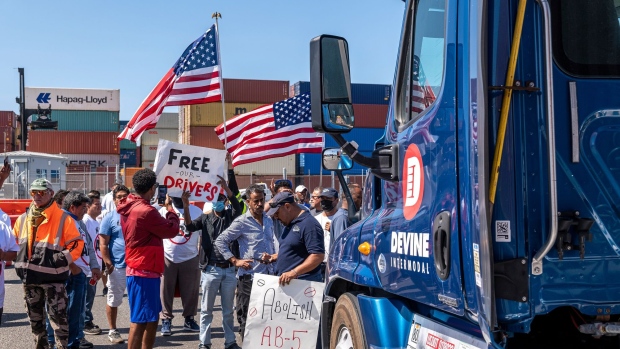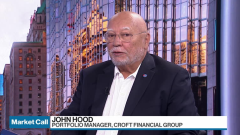Jul 21, 2022
Trucker Protest Keeps Dockworkers From Work at Key California Hub
, Bloomberg News

(Bloomberg) -- About 450 dockworkers have been unable to report to work at California’s third-busiest port of Oakland as truckers protesting a gig-work law block access to the operation for a fourth day.
The largest marine terminal at the port, SSA Marine Inc., which is responsible for much of the cargo that arrives at the port, was closed for a third time this week on Thursday, according to port spokesman Robert Bernardo. The port’s three other terminals have vessel-labor operations under way, he said.
More 1,600 registered dockworkers in the International Longshore and Warehouse Union worked at the Port of Oakland as of last year, according to the Pacific Maritime Association, which acts as a broker for employers.
“Every day, ILWU workers are getting up at 5 a.m. to drive to the dispatch hall and fill jobs at the port,” ILWU Local 10 President Farless Dailey III said in an emailed statement. “But when they get to the terminals, the trucker protests are creating conditions which make it unsafe for workers to pass through the gates and do our jobs.”
Protests began across California last week after the Supreme Court on June 30 refused to review a case challenging the application of Assembly Bill 5 to truckers. The law, passed in 2019, requires workers to satisfy a three-part test to be considered independent contractors, or else be seen as employees entitled to job benefits. About 70,000 truck owner-operators in the state must now comply with the law.
The trucking industry relies on contractors -- who until now have had flexibility to operate on their own terms -- and has fought to be exempt from state regulations for years, saying it could cut into their earnings. A statement from California Governor Gavin Newsom’s office said no one should be surprised by the law’s requirements, and added the industry should focus on supporting the transition just as the state is doing.
“We are in favor of AB5, not against it,” Dailey said. “But we’re not going to put our members in harm’s way to pass through the line of truckers.”
©2022 Bloomberg L.P.


